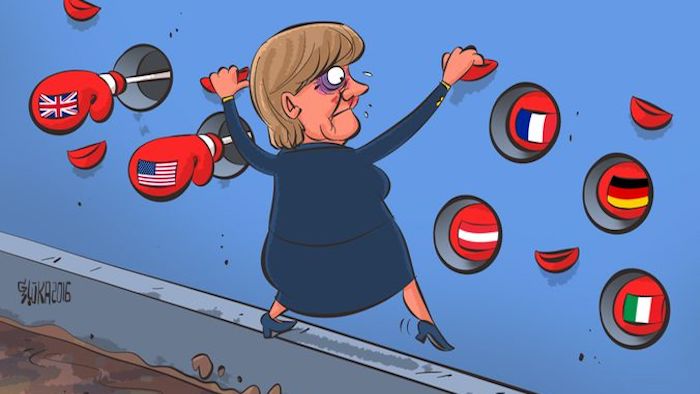Imagine 2019. President Trump has been around for three years, bogged down by court cases in connection with shady deals with among others Saudi Arabia and Russia, dealing with accusations of sexual abuse, the bankruptcy of some of his firms and court cases against his beloved children who could not cope with the “pressure” of having a daddy in power.
In Europe, Marine Le Pen has replaced Merkel as the most influential political leader, supported and acclaimed by like-minded politicians such as Nigel Farrage in the United Kingdom, Geert Wilders in The Netherlands and Viktor Orban in Hungary. The European Union is in disarray, crumbling from within, not able to find a common language and strategy against the increasing brown tide in Europe. At the same time, Vladimir Putin is still comfortably in power, after having discarded most of his inner crowd and old-time friends, and has created the same paranoid dictatorial rule as his predecessor Iosif Vissarionovich Stalin. Everybody knows formally his reign ends in 2024, yet nobody even dares to raise the question of retirement – as it immediately ends a political career and possibly even more.
An unrealistic picture? Alarming maybe yes, but definitely not unrealistic. We have been watching this fundamental change in politics in Europe for a very long time, yet most of us failed to see or, rather, refused to see what was transpiring before our eyes.
I remember how as a young scholar I was trying to imagine how it must have felt living in the 1930s, when gradually the doors and windows to a democratic future were shut and dictatorship became inevitable. It was still before the real disaster began, before Hitler started his wars and followed up with the Endlösung, the extermination of Jews on the European continent. It must have been a horrible feeling, this deep down sense of insecurity, of fearing for your loved ones, of having the feeling you need to get out yet you don’t know where to.
The other day I was on a plane from Copenhagen to the Lithuanian capital Vilnius, and my neighbor found out that I am a Sovietologist. “Will there be war?” was her first question, very sincerely. Here you had a bright young professional, probably not even thirty and with a big future ahead, yet her first question concerned the possibility of war. And immediately following this first question came an equally disconcerting second: “where should I escape too?” undoubtedly triggered by the knowledge that the United States will soon be ruled by Trump and Western Europe is turning “brown” very quickly.
In Lithuania, where I spend much of my time, conversations regularly turn to the question what to do when war breaks out. Some people object to this doomsday scenario, saying that it evokes disaster, yet their number is gradually decreasing. Indeed, there is a chance Marine Le Pen will not win the elections in France, yet one of her main opponents is Francois Fillon, a man with close ties to the Kremlin, who for instance in 2015 sent a delegation of French MPs to the Crimea in order to promote French business. He can hardly be considered much better.
The link between the Kremlin and right wing parties in Europe is a very good indicator of the changed political color in the Kremlin. While in the 1960s and 1970s Moscow maintained close links with leftist and Communist parties in Europe, supporting them financially, and through manipulation and financial injections stimulated the growth of the anti-American peace movement in Western Europe, the political preference is now for the nationalist political right.
It is an unholy union, a new Axis in Europe, and a very dangerous one. It is not based on ideology, as in the times of the Soviet Union, but based on pure pragmatism: right-wing Europe is anti-establishment, anti-European Union, and is fundamentally destructive. And in that way it is Putin’s best friend, as his policy is focused on destroying the European Union before the Russian Federation itself disintegrates. It is a struggle for life and death.
In 1939-1940 The Netherlands had a Prime-Minister, Colijn, an old-fashioned benign “father of the nation”. It was pre-television time, so radio was the main communication channel, widely listened to. He would appear on the air with his solemn baritone voice, giving his view on world politics, and end with the now infamous urge to the Dutch population not to worry, to go to bed quickly because “everything will be alright.”
How much “alright” it was, the Dutch found out on May 10, 1940, when German paratroopers were dropped all over the country, surprising a totally unprepared Dutch army. Within five days the country was on its knees and the city of Rotterdam a smoking ruin.
We often say “never again”, referring to the Holocaust. Yet we know it happened again, and again, and again. Pol Pot in Cambodia, the genocide in Rwanda, Srebrenica in former Yugoslavia… The list is long, and a constant reminder we tend not to learn from the past. But maybe we can learn one thing: not to allow ourselves to be soothed and urged to sleep. The danger is real, the danger is imminent, and needs to be confronted. Our freedom is at stake.
Related:
- Putin using all means against the West -- including Islamist terrorism -- Piontkovsky says
- Putin wants to do more than to install Trump as US president: he wants to destroy the West
- Putinism isn't the Brezhnevism of today: it's far more dangerous and vigorous, Pavlova says
- Why is the "European CNN" becoming the voice of the Kremlin?
- Hybrid Olympics, hybrid war with Ukraine, hybrid Russia
- Armed invasions don't have "golden middles," blaming victims encourages evil





